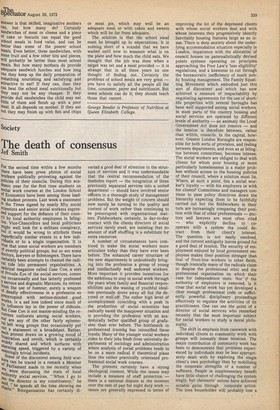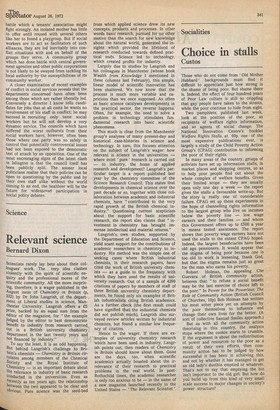Society
The death of consensus
Jef Smith
or the second time within a few months there have been press photos of social Workers publically protesting against the Policies of their councils. During this academic year for the first time students on social work courses at the London School Of Economics have been among those leading student protests. Last week a statement In the Times signed by nearly fifty social scientists and senior social workers expressed support for the defiance of their council by local authority employees in Islington. Vice-Chancellors and local politicians !night well look for a militant conspiracy, out it would be wrong to attribute these superficially similar events to a few individuals or to a single organisation. It is true that some social workers are members ,ef overtly political groups, but so are some eoctors, lawyers or fishmongers. There have certainly been attempts to channel the radical tide into permanent organisations. A satirical magazine called Case Con, a sort of Private Eye of the social services, comes tlat occasionally and has latterly professed at serious and dogmatic Marxism; its retreat r°rn the use of humour, surely a weapon °I deadly effectiveness in a profession so Preoccupied with serious-minded good Yorks, is a sad loss indeed since much of influence lay in the power of ridicule. ut Case Con is not master-minding the reeUrrent outbursts among social workers, P,.or are any of the other fairly epheme'al left wing groups that occasionally put :Ut a statement or a broadsheet. Rather, ,ech protest draws on a growing mood of 'wre. stration and revolt, which is certainly ulT shared and which surfaces with zarrning speed, triggered by a variety of eerningly trivial incidents. Some of the discontent among field wor,s can be traced in a remark a Member Parliament made to me recently when e were discussing the state of local t_itithority social services. "When I go to saiA the director in my constituency," he '.' he spends all the time showing me arts." Reorganisation has certainly di
verted a good deal of attention to the structure of services and it was understandable that the central recommendation of the Seebohm report — the integration of three previously separated services into a united department — should have involved senior officers in a thorough study of management problems. But the weight of concern should now surely be turning to the quality and content of work rather than continuing to be preoccupied with organisational matters. Fieldworkers, certainly, in day-to-day contact with the clients directors of social services rarely meet, are insisting that no amount of staff shuffling is a substitute for extra resources.
A number of circumstances have combined to make the social workers more articulate today than they have ever been before. The enhanced career structure of the new departments is undoubtedly bringing into the profession a group of young and intellectually well endowed workers. More important it provides incentives for the ambitious to stay in social work through the years when family and financial responsibilities and the waning of youthful idealism previously drove away all but the devoted or or well-off. The rather high level of unemployment coinciding with a peak in the production of social scientists has radically eased the manpower situation and is providing the profession with an academically better qualified group of graduates than ever before. The bottleneck in professional training has intensified these trends. Many of the younger social workers come to their jobs fresh from university departments of sociology and administration where analysis of social problems tends to be on a more radical if theoretical plane than the rather practically orientated professional social work courses.
The protests certainly have a strong ideological content. While the issues may include a measure of staff protection — there is a national dispute at the moment over the rate of pay for night duty work — issues are generally expressed in terms of
improving the lot of the depressed clients with whom social workers deal and with whose interests they progressively identify Inevitably housing features large as an issue. There is deep anxiety about the underlying accommodation situation especially in London, impatience with the allocation of council houses on paternalistically devised points systems operating on principles approaching the Poor Law's 'less eligibility' regulations, and a keenness to cut through the bureaucratic inefficiency of much public housing management. The Family Squatting Movement which embodied just this sort of discontent and which has now achieved a measure of respectability by negotiating agreements for the use of shortlife properties with several boroughs has been well supported among social workers. In most parts of the country housing and social services are operated by different levels of authority — an anomaly the Local Government Act does not remove — and the tension is therefore between, rather than within, councils. In the capital, however, Greater London Boroughs are responsible for both sorts of provision, and feeling between departments, and even as at Islington between committees, becomes intense. The social workers are obliged to deal with clients for whom poor housing or more particularly homelessness is a major problem without access to the housing policies of their council, where a solution must lie. Where, at such a point, lies a social worker's loyalty — with his employers or with his clients? Committees and managers continue to pass policy directives down the hierarchy expecting them to be faithfully carried out but the fieldworkers in their turn are increasingly comparing their position with that of other professionals — doctors and lawyers are most often cited — who explicitly decline to • cooperate with a system tha could detract from their client's interest. The question is not easily resolved, and the current ambiguity leaves ground for a good deal of tension. The security of employment enjoyed by local government employees makes their position stronger than that of front-line workers in other fields, though ironically many of the radicals claim to despise the professional ethic and the professional organisation On which their case for independence rests. Nor ' if the authority of employers is removed, is it clear that social work has yet developed a clear enough professional code or sufficiently powerful disciplinary proceedings effectively to regulate the activities of its practitioners. One can see the point of a director of social services who remarked recently that the most important subject for social workers to study is moral philosophy.
The shift in emphasis from casework with individual clients to community work with groups will intensify these tensions. The major contribution of community work has been to demonstrate that problems experienced by individuals may be less appropriately dealt with by exploring the single client's own psychology than by mobilising the corporate strengths of a number of sufferers. People in supplementary benefit have little chance of challenging the system singly, but claimants' unions have achieved notable gains through corporate action. The lone householder will probably lose a battle which a tenants' association might fight strongly. An isolated mother has little to offer until roused with several others like her to found a playgroup. But if social workers are to act as facilitators of such alliances, they are led inevitably into conflict situations with and on behalf of the groups they serve. A community group which has done battle with central government agencies and other public corporations is not likely to be swayed from tackling its local authority by the susceptibilities of its community worker.
A closer examination of recent examples of conflict in social services reveals that the departments concerned have often been among those which are rather liberally led. Conversely a director I know tells candidates for jobs that at all costs he wants no involvement of his staff in conflict; he may succeed in recruiting only tame social workers but he will not develop a very dynamic service. The councils which have suffered the worst outbursts from their social workers have, however, often been those where one party was so safely in control that potentially controversial issues had not been exposed to the democratic test of attack by an opposition. One of the most encouraging signs of the latest clash in Islington is that the council itself has been publicly split. The sooner local politicians realise that their policies can be Open to questioning by the public and by their own staff alike without the world coming to an end, the healthier will be the future for widesprPad participation in social policy debates.











































 Previous page
Previous page